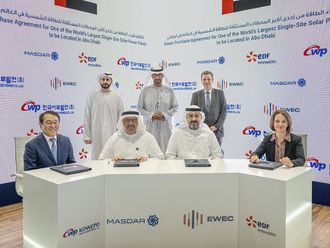Muscat: Petroleum Development Oman (PDO) is likely to lift crude production to 600,000 barrels per day (bpd) before 2019, the company’s managing director said in an interview on Sunday.
Oman’s major oil and gas explorer and producer said last month it plans to increase production by 5 per cent to an average of 600,000 bpd for ten years from 2019.
“I would be disappointed if we didn’t [reach it early],” Raoul Restucci told Gulf News at PDO’s offices in Muscat without stating how early.
“Very strong WRFM [Wells, Reservoir and Facilities Management] and EOR [enhanced oil recovery] gives us confidence in delivery of higher production,” he said.
The state-controlled company’s planned average for 2015 is 570,000 bpd, although it has exceeded that so far this year.
“At the moment we’re on the average of about 580,000 [bpd],” Restucci said.
On Monday, Oman’s Minister for Oil and Gas, Mohammad Bin Hamad Al Rumhy, told the Oman Tribune that the country will produce between 980,000 bpd and 990,000 bpd this year. Oman produced 943,000 bpd in 2014.
PDO is spending half of the $40 billion (Dh146.9 billion) it is investing on projects over the next five years on its “oil investment plan,” Restucci said.
PDO is owned 60 per cent by the Omani government, 34 per cent by Royal Dutch Shell, 4 per cent by Total and 2 per cent by Portugal’s Partex, according to its website.
Restuci also said the “oil price is not affecting” plans to increase production.
“$50, $60, $70, $80 a barrel, whatever number you choose, our target from 2019 is 600,000 for a plateau period of 10 years,” he said.
Brent Crude, the international market for oil, was trading at $65 a barrel on Sunday, better than January’s $45 a barrel but still down on the $115 a barrel high a year ago.
PDO previously said it has identified over $120 million in savings with contractors over the next two years. Restucci did not state a savings target amount but said that PDO “will continue to build” on what has already been found.
“We’ve only just started,” he said.
Last month, Restucci announced pauses to the Habhab oilfield, an ultra-heavy oilfield, and the Budour gasfield.
“[Habhab is] a very, very difficult field,” Chris Breeze, Shell’s country chairman for Oman, told Gulf News.
PDO will make “very small investments” over the next five to ten years in Habhab, Restucci said, as it tries to unlock an estimated 2.4 billion barrels of oil, according to the company’s 2012 annual results.
“It’s not a commercial issue. It’s a technical recovery issue we’re trying to unlock,” he said.
Budour has been paused because of the discovery of a larger amount of gas than expected.
“We’ve got additional upgrades this year that will confirm the size of the accumulation, then a concept and detailed design studies will carry on next year. So you’re looking at an 18 month- to two-year [period] of potential pause,” Restucci said.












